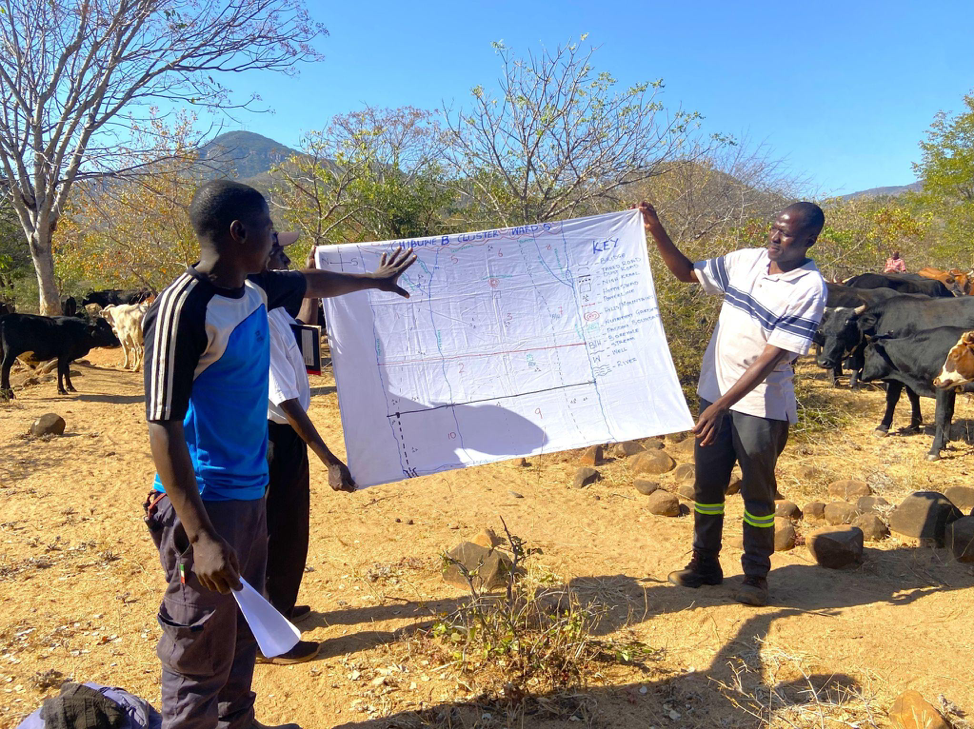
Tendai Ziha (42), a smallholder livestock farmer from Chibuwe B cluster, is seeing a major shift in his fortunes thanks to the Holistic Land and Livestock Management (HLLM) approach introduced by Towards Sustainable Use of Resources Organisation (TSURO) Trust, a PELUM Zimbabwe member. Tendai has worked with TSURO for the past eight years, and today he credits the organisation with helping him survive some of the worst climate shocks and livestock losses his community has ever faced.
“I started working with TSURO Trust in 2018 but I was not as active in Holistic Land and Livestock Management (HLLM) as I am now. My livestock used to suffer immensely. Droughts and environmental shocks used to affect me as I relied heavily on agriculture for my livelihood. In 2023, the drought and ensuing disease outbreak left me on the brink of giving up farming totally. That is when I was introduced to HLLM by TSURO Trust,” he shares.
Before this turning point, Tendai says he had little understanding of structured livestock care. His animals roamed freely, with no thought given to planned grazing or the impact of livestock on soil health.
“Before I started working with TSURO Trust, I used to herd my animals haphazardly. I would just send them out and then look for them in the evening to take them back to the kraal. I did not have any knowledge of planned grazing or crop field impaction. Now that I am part of the HLLM group formed through the facilitation of TSURO Trust, I have gained valuable information about livestock management and how livestock can also help us in farming,” he explains.
Through HLLM, farmers in Tendai’s community are now practising collective herding and using their animals to improve the land through a method known as crop field impaction.
“Crop field impaction has significantly increased the organic matter in our soil. Consistent animal presence on the crop fields improves aeration and the animal waste improves the vitality and soil nutrients and density. As a result, the soil can hold more moisture, which is crucial for our crops, especially since our community is in natural farming region 4,” Tendai says.
He adds that this shift has also helped farmers reduce reliance on expensive synthetic inputs.
“Previously, we relied on synthetic fertilizers for farming. We were totally oblivious that we could enrich the soil with organic matter from manure to create a healthier environment for our crops to thrive. This approach not only leads to better yields but also fosters a more sustainable farming system, ensuring our land remains productive for years to come,” he adds.
Other farmers are echoing Tendai’s sentiments. Joshua Maringe (68), chairperson of the Hotsprings Chibuwe B HLLM committee, says the benefits of the approach are clear for all to see.
“HLLM has significantly benefited our community by improving soil fertility and the livelihoods of the community members. By implementing crop field impaction, we are improving soil health and boosting crop yields, which leads to greater financial returns and this approach is enabling farmers to invest in their livelihoods and support their families. Some are selling grains and even their livestock and get money, fostering economic resilience,” he says.
The approach has also improved animal health and safety. Julian Makuwa (42), a field officer with the Department of Veterinary Services, says better control of livestock movements has helped reduce accidents and disease outbreaks.
“By keeping livestock in designated areas, communities are reducing the risk of injuries from livestock roaming along motorways and so on. If livestock are concentrated in one location, it is much easier to manage their health and treat diseases, leading to better overall animal welfare,” she explains.
The HLLM model is proving to be a game changer for communities like Chibuwe B. Beyond improving soil and livestock health, it’s promoting economic stability and resilience in the face of climate shocks. As farmers like Tendai embrace this approach and share their knowledge with others, they are building a stronger, more sustainable future for themselves and generations to come.







